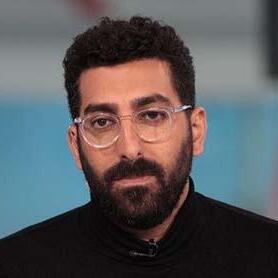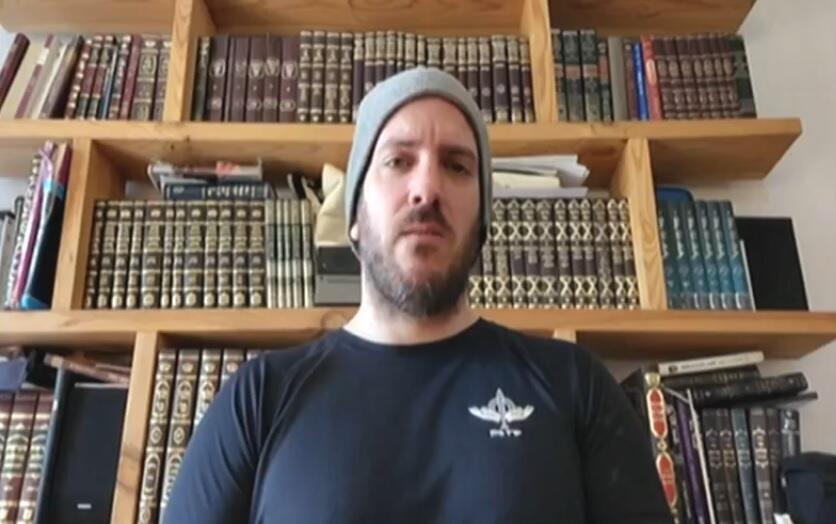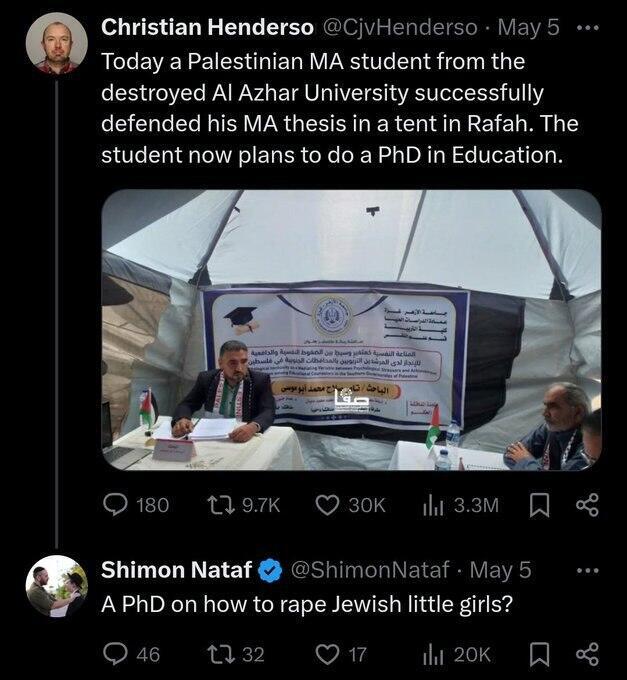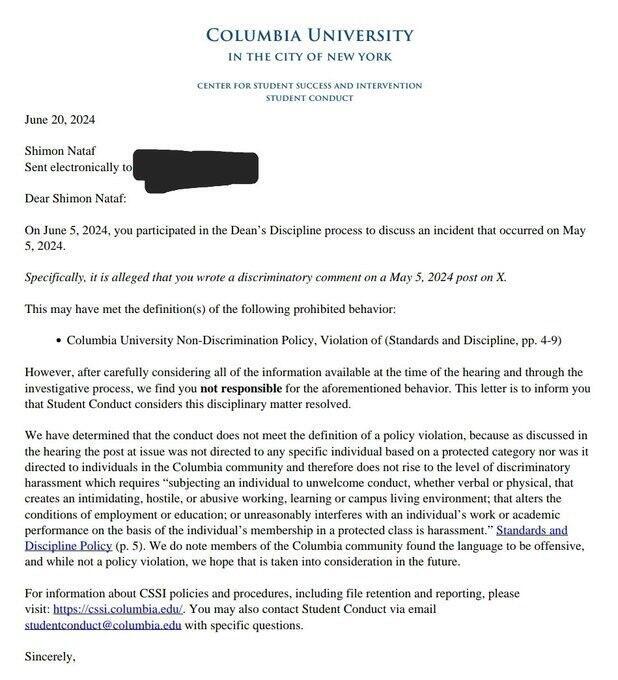Getting your Trinity Audio player ready...
Attorney Shimon Nataf, a law Ph.D. candidate at Columbia University recently won a small victory against pro-Palestinian students on campus. After complaints were made over a comment he posted alluding to Hamas's sexual crimes, the university found no wrong and said no disciplinary steps should be taken against him.
"I don't know if I won against the university. I won against the Hamas supporters who tried to use the university's disciplinary procedures to harass me. I'm not the only one," he said in an interview with Ynet on Monday.
The incident began when Nataf responded to a post by a Palestinian from the "destroyed al-Azhar University' in Gaza, on X, who said he had successfully defended his MA thesis from a tent in Rafah and was on his way to a Ph.D. in Education. "A PhD on how to rape Jewish little girls?" The Israeli sarcastically asked in his posted response.
He was summoned for a hearing at the university's Center for Student Success and Intervention (CSSI) earlier this month and told complaints had been filed against him.
After consulting with his doctoral advisors, Nataf hired a New York lawyer with experience in the field and drafted a defense statement in preparation for the hearing. In the document, he detailed, among other things, the horrific scenes in southern Israel during the first days of the war, as he personally experienced during his service as an IDF reservist.
"I came to the hearing prepared," he wrote on X. "I asked the 'judges' exactly which rule I broke. They replied, 'discrimination.' I asked: 'Discrimination against which protected group? Hamas?' and they had no good answer. The hearing was stressful, and they constantly tried to extract an apology from me. I stressed that I saw the procedure as an attempt to silence discussion about Hamas's sexual violence."
Last week, Nataf was notified that the charges against him were dismissed. "I want to say this to Israeli and Jewish students at Ivy League universities in the U.S.: if you have disciplinary proceedings initiated against you due to tactical complaints by Hamas supporters – don't panic. Get in touch,” he said.
"What mainly bothered me about that post was that Al-Azhar University was considered a legitimate university like any other," Nataf said. "We know today that it was a terrorist stronghold, that there were underground tunnels, Hamas weapons, and Hamas documents in there. Hamas used the university as a base for terror in every sense, and I referenced Hamas's sexual violence on October 7 in my post. Is that what they study there? I asked. The post rubbed some students at Columbia the wrong way," he said.
"They saw my social media account listed me as a Ph.D. student at the university and decided to file complaints against me. I saw that dozens of complaints were made. It's a tactic. They probably have some kind of WhatsApp group where they tell everyone to file a complaint against Shimon Nataf. That's what happened. So, the university started proceedings against me."
Did they want to expel you?
"Hamas supporters definitely tried to get me expelled, but as far as the university is concerned, this is how it works: they first send you a letter saying you have a hearing, and at the hearing, they decide whether to proceed with disciplinary action that could lead to more severe penalties, reject the claims, or settle for a warning.
“I know students who were so frightened that they agreed to a sort of plea bargain, where they receive some reprimand that goes into their personal file, which is dramatic, in exchange for apologizing and saying 'Sorry, we didn't mean to offend.’"
But you didn't back down or agree to such a deal.
"No. I wrote a defense statement and consulted with a lawyer that my advisor arranged for me. He’s a lawyer from the Brandeis Center, a Jewish human rights organization in the U.S. We drafted a defense statement, where most of what I did was describe the things I saw in southern Israel during my reserve service,” he explained.
“I serve in the Israel Police’s Special Patrol Unit (Yasam), we arrived there on October 8 so I have personal experience from there. I'm not talking about reports in the media; I'm talking from personal experience, the things I saw. I think I made them very uncomfortable. They didn't realize that this was the kind of student they were dealing with, someone who actually participated in the war for five months, and I think they got a bit scared,” he added.
"During the hearing, I also made some compelling legal arguments and absolutely refused to apologize for what I wrote. They kept trying to persuade me: 'Come on, Mr. Nataf, why do you care? Just apologize; people are hurt. Why bang your head against the wall? Apologize.' I said: Of course, people are hurt, I intended for it to hurt – but I only intended to hurt Hamas supporters, no one else."
4 View gallery


Pro-Palestinian encampment at Columbia University
(Photo: Stephanie Keith/Getty Images)
Some people say Israelis and Jews shouldn’t study in such anti-Israel universities, what do you think about it?
"I think it needs to be a serious consideration. I've already began my studies, and I don't think it's wise to stop. These universities still have a certain prestige that can be of value. In the long term, I do think we need to start seriously considering what value these universities really provide, and maybe study somewhere where we don't need to accept this kind of thing, but I think that will take a long time,” he said.
“Ultimately, these universities provide academic prestige in the world right now; you can't ignore that, and there's no way to avoid playing this game. I don't have a good answer, but it’s a real problem."






